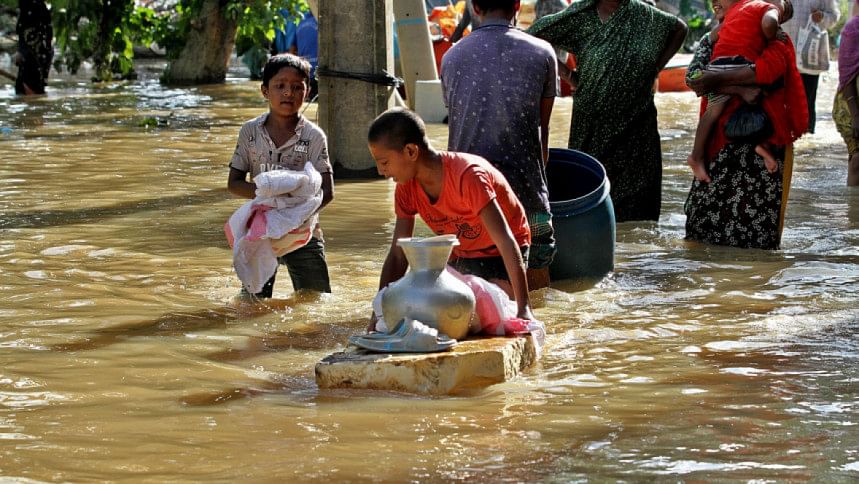Preparing Generation Alpha for a Charitable Future

The International Day of Charity, observed annually on September 5, serves as a powerful reminder that charitable efforts play in addressing global challenges. Established by the United Nations in 2012, this day commemorates the death anniversary of Mother Teresa, whose life and work epitomised the essence of charity, and encourages individuals, organisations, and nations to contribute to philanthropic activities that promote human well-being, alleviate poverty, and foster sustainable development.
Charity has been an integral part of Bangladeshi culture for centuries, rooted in religious, social, and cultural traditions. Whether through Zakat (Islamic almsgiving), voluntary service, or philanthropic donations, the people of Bangladesh have always been inclined to help those in need. This tradition of giving has been instrumental in shaping the nation's response to various crises, from natural disasters to poverty alleviation.
As we commemorate the International Day of Charity 2024, we must recognise the pivotal role of Bangladesh's younger generations in driving social change. Generation Z's brave and compassionate efforts have led to a significant impact in Bangladesh, contributing to positive transformations across the country. Now, as we look to the future, we should focus on developing Generation Alpha, born between 2010 and 2024, with the same spirit of empathy and social responsibility to ensure they can lead even more profound and lasting change in the days ahead.
Generation Z in Bangladesh has demonstrated remarkable resilience and social consciousness. From leading the anti-discrimination movement to supporting disaster relief efforts and advocating for social justice, these young individuals have shown that they are ready to tackle the pressing challenges facing their communities. Initiatives such as student-led road safety processions and youth-driven fundraising campaigns for disaster relief have not only addressed immediate needs, but have also inspired a culture of active citizenship. Young Bangladeshis' organised relief efforts, collected donations, and volunteered their time to support flood-affected communities. Their efforts have provided immediate assistance while setting a precedent for future generations on the importance of collective action and compassion.
To build on the positive momentum created by Gen Z, it is crucial to prepare Gen Alpha—those born from the early 2010s onwards—to take the baton and drive further transformation. As we observe the International Day of Charity 2024, it is vital to reflect on how we can instill a charitable mindset in Gen Alpha from an early age. This generation, born into a rapidly changing world, has the potential to drive transformative change. Gen Z has already set a high bar with their impactful initiatives and compassionate responses to societal challenges. Now, it is essential for schools across Bangladesh to equip Gen Alpha with the life skills to cultivate a charitable mindset needed for even greater transformation.
Drawing from successful global models, Bangladesh can integrate service learning and philanthropy into its school educational system. For example, US schools use service learning to combine academic learning with community service. Many schools across the US partner with Habitat for Humanity, a global nonprofit organisation that builds affordable housing for families in need. Students from high schools participate in building homes, fundraising, and community awareness activities. By incorporating similar attachment programs, schools in Bangladesh can provide students with practical experience in addressing community needs, fostering a deep-rooted sense of empathy.
Gene Alpha will also inherit a world facing significant environmental challenges. Schools in countries like Finland and Japan have set examples by involving students in sustainability projects and environmental education. For instance, in Japan, schools often organise student volunteer initiatives in response to natural disasters, such as earthquakes and tsunamis. Students participate in cleanup operations, fundraising, and providing emotional support to affected communities gaining resilience and solidarity in times of crisis.
"Me & MyCity" is an award-winning Nordic (Finnish) learning concept that introduces students to economics, working life, and entrepreneurship through hands-on simulations. It also includes elements of social responsibility, where students engage in charitable activities as part of their "city" experience, fostering entrepreneurial thinking along with a commitment to social welfare. In Bangladesh, adopting green initiatives, such as school gardens, waste segregations and recycling programs can instill a commitment to environmental stewardship from an early age.
Encouraging students to take on leadership roles in community service projects can build on the legacy of Gen Z's activism. Programs such as the Student Volunteer Army in New Zealand, that involves students in disaster response and recovery efforts, and the National Schools Tree Day in Australia, an annual event where students plant trees and engage in environmental conservation activities, provide excellent examples of how youth can be mobilised to address social and environmental issues. Hong Kong schools participate in Kids4Kids programs encouraging students to support community causes and engage in sustainability efforts. Implementing similar projects in Bangladeshi schools will help Gen Alpha develop leadership skills and a strong sense of community responsibility and civic engagement.
By drawing on the positive changes spearheaded by Gen Z and adopting global best practices, Bangladesh can effectively prepare Gen Alpha for a future of meaningful social impact. Schools have a critical role in this process, serving as the incubators for the next generation of compassionate leaders. Incorporating charitable education, promoting environmental stewardship, encouraging youth philanthropy, fostering inclusivity, and emphasising leadership will equip Gen Alpha with the values and skills needed to continue the legacy of positive transformation.
Bangladesh's contributions to global charity extends beyond its borders, with numerous individuals and organisations making a significant impact on the international stage. The spirit of charity and collective action is also evident in the Bangladeshi diaspora, which has made substantial contributions to their home country and beyond. As we celebrate the International Day of Charity, let us commit to nurturing a generation that not only inherits the lessons of the past but also rises to meet the challenges of the future with courage, kindness, and solidarity.
Dr Iftekhar Ul Karim is adjunct assistant professor at ZNRF University of Management Sciences. He can be reached at [email protected].
Views expressed in this article are the author's own.
Follow The Daily Star Opinion on Facebook for the latest opinions, commentaries and analyses by experts and professionals. To contribute your article or letter to The Daily Star Opinion, see our guidelines for submission.

 For all latest news, follow The Daily Star's Google News channel.
For all latest news, follow The Daily Star's Google News channel. 










Comments